COVID-19 treatments
If you test positive for COVID-19, the question everyone asks is: what can I take right now to avoid getting sicker? The short answer: there are effective antiviral drugs for people at higher risk, plus simple home measures that help most people feel better. Treatment choice depends on how sick you are, your risk factors, and how soon you start therapy.
Key approved options
Paxlovid (nirmatrelvir + ritonavir) is the go-to oral antiviral for people at higher risk of severe disease. It works best when started within five days of symptoms. Warning: Paxlovid interacts with many common drugs (statins, some blood thinners, certain heart meds), so check with your doctor or pharmacist first.
Remdesivir (IV) is an antiviral given in a clinic or hospital and can be used early for high-risk patients too. It’s usually given over a few days and is an option when oral meds aren’t suitable.
Molnupiravir is another oral option when Paxlovid isn’t appropriate. It’s less effective than Paxlovid but still helpful to reduce hospital risk for some adults. Doctors generally reserve it for cases where other antivirals can’t be used.
Monoclonal antibody treatments used to be common, but their usefulness depends on the virus variant. Some antibodies no longer work well against newer variants, so availability and recommendations change. Your clinician can tell you if an antibody is an option.
Practical steps if you test positive
1) Call your healthcare provider right away if you’re over 60, have diabetes, heart disease, obesity, lung disease, weakened immunity, or other risk factors. Early treatment matters.
2) Ask whether Paxlovid is appropriate and safe for you. If not, ask about remdesivir or molnupiravir. If you’re low-risk and symptoms are mild, supportive care at home is usually fine.
3) Avoid unproven remedies. Drugs like ivermectin or routinely using azithromycin for COVID are not recommended by major health agencies for treating COVID-19. Using them without medical advice can be unsafe.
Home care basics: rest, stay hydrated, use acetaminophen or ibuprofen to reduce fever and pain, and monitor breathing. Isolate from others until you meet current local guidance for ending isolation.
Know when to go to the emergency room: trouble breathing, persistent chest pain or pressure, new confusion, inability to wake or stay awake, or bluish lips/face. Those are red flags—get urgent care.
Vaccination and boosters remain the best prevention against severe COVID-19. If you’re eligible for antivirals or monoclonal therapy, act fast—these treatments are time-sensitive. Always talk with a clinician or pharmacist about interactions, dosing, and the best option for your situation.
This informative article explores ten viable alternatives to Hydroxychloroquine, detailing each one's unique benefits and potential drawbacks. Offering insight into both tried and tested as well as emerging options, this piece provides critical information for those seeking alternative treatments for conditions Hydroxychloroquine typically addresses. From malaria and autoimmune diseases to other viral infections, readers will discover a wealth of knowledge to aid in informed decision-making. A helpful comparison table summarizes these options for quick reference.

